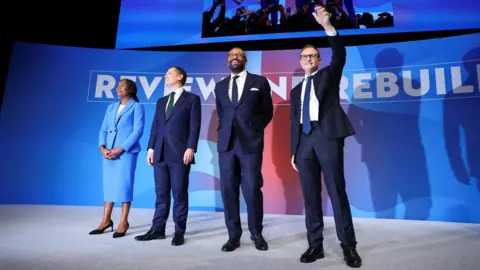 Reuters
ReutersThe four Conservative leadership hopefuls have set out their visions for reforming the party after its historic defeat in the general election this year.
Tom Tugendhat, James Cleverly, Robert Jenrick and Kemi Badenoch tried to woo members in speeches to their party’s conference in Birmingham.
Cleverly said the party needed to be “more normal” to win back voters who deserted them for Reform UK.
Tugendhat pledged a “new Conservative revolution” that focused on delivering better public services.
Jenrick called for a “new Conservative Party” and promised “an effective freeze in net migration”, while Badenoch said she would “reprogramme the British state” based on “renewed Conservative principles”.
The Tory leadership contest has dominated the conference as the party seeks to recover from its worst-ever performance at a general election in July.
In a break with tradition, the four candidates closed the conference with their speeches to the party faithful, rather than outgoing Conservative leader Rishi Sunak.
After being grilled by delegates and the media for days, the four would-be leaders will be whittled down to two in a vote by Tory MPs next week.
Conservative members will then pick the new leader from the final two in a final vote, with the result announced on 2 November.
In their speeches, each candidate attacked Prime Minister Keir Starmer and said their party could win the next general election under their leadership, but not without changing its direction.
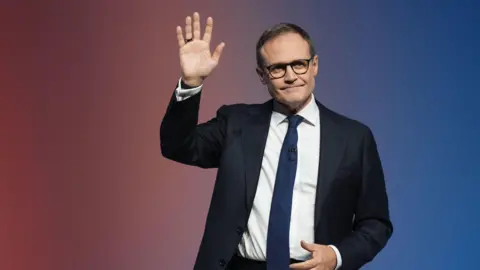 PA
PATugendhat, who was up first on the conference stage, said there had not been enough “substance” in the Tory leadership campaign.
A former security minister, he talked up his experience in the armed forces in Iraq and Afghanistan and how that would make him an effective leader.
He made a direct appeal to voters who abandoned the Tories for Reform, Labour and the Liberal Democrats.
The truth was, he said, many who shared Conservative values did not vote for them.
He said the Tories needed to “focus on what the British people need and be absolutely ruthless about delivering it, from health care and immigration to security and education”.
“We need a new Conservative revolution,” he added. “That’s what Margaret Thatcher did. That’s what we must do again, and we can do it.”
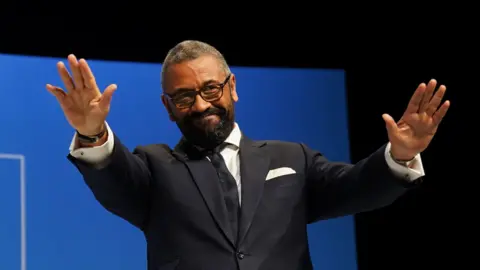 PA
PACleverly opened his speech by saying “sorry” to Conservative activists for the result of the general election, on behalf of Tory MPs.
But in an upbeat speech peppered with jokes, the former home and foreign secretary said he knew from his past life in business what it felt like to fail and get back up again.
He said his political hero was former Republican US President Ronald Reagan and suggested the Conservative Party should follow his example.
“Let’s be enthusiastic, relatable, positive, optimistic,” Cleverly said. “Let’s be more normal.”
He said Reform UK was just a “pale imitation” of his party and stressed there would be “no mergers, no deals”.
And to enthusiastic applause, he called for the abolition of “bad taxes like stamp duty” and more housebuilding.
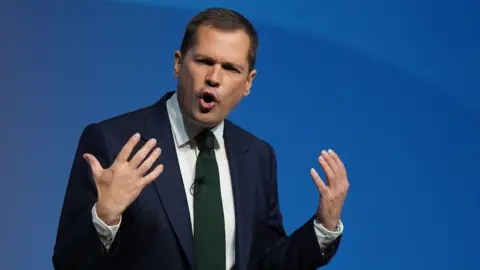 PA
PAJenrick – the bookies’ favourite to win – said he would rebuild “a new Conservative party”, an echo of New Labour in the 1990s.
The former immigration minister admitted the last Conservative government “failed to deliver the strong NHS, the strong economy and, yes, the strong border we promised”.
In language used by Reform UK MPs, Jenrick outlined five changes the party must make to challenge Labour, including “securing our borders” and “defending our culture”.
He said he would introduce “an effective freeze in net migration” and leave the European Convention on Human Rights, an international treaty.
Jenrick, who voted to remain in the 2016 EU referendum, promised a British Bill of Rights to “finish the job” begun by Brexit, and an increase in defence spending, funded by cutting overseas aid.
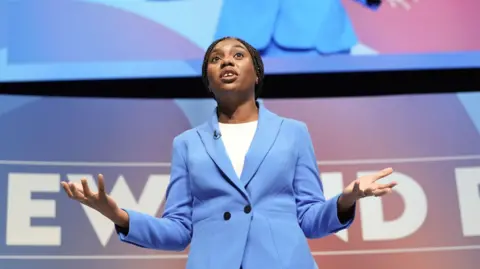 PA
PALast to speak was Badenoch, who pledged a “reboot” of the British state as she attacked what she branded “agressive identity politics” and “socialism”.
Speaking about her upbringing in Nigeria, Badenoch said she valued “Conservative freedoms” and had “seen what happens when a country loses sight of those principles”.
The former business secretary argued that the UK’s system of government was “broken” and her party needed to go back to “first principles” to fix it.
“If I become leader, we will immediately begin a once in a generation undertaking,” she said, promising a “comprehensive plan to reprogramme the British state”.
Her plan, she said, would focus on reforming international agreements, human rights laws, the Treasury, the Bank of England, the civil service and NHS.
She said her campaign was about “renewal” in time for the next general election, adding: “We have it in our power to make the 2030s a golden decade.”
In the party’s first conference out of government for 15 years, the round of speeches followed the same format that propelled David Cameron into pole position for the leadership in 2005.
In that conference, Cameron spoke without a full text of his speech, while this time all but Jenrick used a teleprompter.






